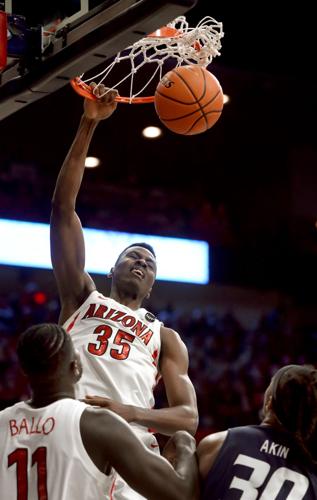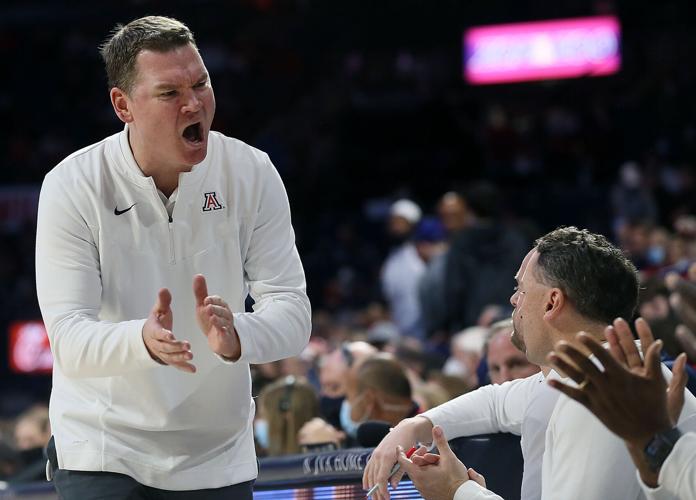KNOXVILLE, Tenn. — When new Arizona coach Tommy Lloyd effectively swapped a scheduled road game against his old team at Gonzaga for one at Tennessee this season, he avoided a potentially emotional and awkward outing.
But that didn’t mean his Wildcats would have a much easier time of it.
In the initial months after Arizona hired Lloyd to take over for Sean Miller in April, the Wildcats were expected to lose road games at Tennessee and at Illinois, plus maybe a neutral-site game with Wichita State or even a home game against Wyoming. Who knows, maybe somebody like North Dakota State would give them a scare, too.
Then they went 11-0 until a four-point loss at Tennessee to close out nonconference play on Wednesday, surpassing virtually all expectations ... except Lloyd’s.
Because he didn’t have any — at least not the big-picture kind.
“Honestly, I have possession-by-possession, day-by-day expectations,” Lloyd said after the Wildcats lost 77-73 at Tennessee. “I don’t have a secret envelope with a bunch of goals written down. It’s like, ‘Try to beat Tennessee.’ We didn’t. Now, we’ll respond.”
Lloyd may not want to categorize how the Wildcats exceeded expectations through nonconference play, and an early conference game at Oregon State, we’ll take a shot at it. Here’s five reasons:
1. The Wildcats like each other
As cold and boring as some analytics may appear, the Wildcats’ ratio of assists to made field goals speaks not only to Lloyd’s movement-based offensive philosophy but also to his team’s heart.
The Wildcats record an assist on 65.3% of their made baskets, the third-highest ratio in Division I, indicating they routinely look for the best shots that teammates may have instead of driving or shooting the ball as they desire.
They also do so despite having flipped over half their 12-player roster in the transition from Miller to Lloyd in the offseason.
“I just like the way we play with each other,” wing Bennedict Mathurin said. “We trust each other. We trust Tommy Lloyd, our coach. We have a lot of new players on the team and the fact that we were able to stick together that quick amazed me. It’s pretty fun.”
Standouts such as Mathurin, forward Azuolas Tubelis and center Christian Koloko are all projected NBA draft picks, the kinds of guys who might want to make sure they’re getting touches and shots to keep their resumes shining. But their actions suggest that isn’t the case.
In the delightfully direct manner in which he uses the English language, Tubelis summed it up verbally, too.
“I just can say that I love this place,” Tubelis said earlier this month. “Because how we move the ball now, it’s high-level basketball.”
2. They’re swaggy
One of the bigger questions entering the season was how the Wildcats would replace all-conference point guard James Akinjo.
Kerr Kriisa had played the point for his Lithuanian club and the Estonian national team, while Swedish import Pelle Larsson started at point guard for Utah late last season, and Dalen Terry has shown an affinity for artful passing. But none were veteran point guards at the college level.
That didn’t matter to Kriisa, who took over the position from the start, strapping on a bandana for practices and a headband for games, chattering to opposing players and fans alike to get under their skin.
While Kriisa is not yet the shooter or foul-magnet Akinjo was last season, his spirit has been routinely cited for a contagious effect on the Wildcats, who didn’t flinch when Wichita State took them into overtime, nor when they played in a rabid road environment at Illinois – or even at Tennessee, when they lost by four points in a game that Kriisa was whistled for a technical when he said something officials did not approve of.
Lloyd said early in the season that Kriisa, the son of a father who played professional basketball and a mother who was a high-level ice skater, had “swag,” or a certain confidence that was evident in how he carried himself.
Since then, Lloyd has watched how the Wildcats have become infected with that swag, combining Kriisa’s bark with the bite of a big, long lineup that includes two 6-6 wings Mathurin and Terry, plus the 6-11 Tubelis and 7-foot Koloko inside.
“This team has scrappy, tough streak in it,” Lloyd said. “We just have to access it. We have it most of the time, and we just have to access it all the time. When we’re aggressive and tough and share the ball, we’re really good. When we’re casual and soft and don’t block out, we’re not very good.”
3. They can defend at a high level
For all the buzz about Lloyd’s uptempo ways, and the fact that UA leads the nation in scoring offense with an average of 89.5 points per game, the Wildcats are even better on the defensive end.
While tipping his cap to Miller for grounding a defensive focus into the Wildcats’ returning players, who have uniformly been the team’s best so far this season, Lloyd also has helped them improve from being the nation’s No. 59 team in defensive efficiency to No. 8.
In that tempo-free metric, which better measures a defense than points allowed, Arizona opponents score just 88.6 points per 100 possessions. The Wildcats are especially rough on opponents inside the 3-point arc, leading the nation in defensive two-point percentage (39.3%) and blocking 17% of their opponents’ shots.
And while the Wildcats struggled to defend the 3 particularly against Illinois (44.4%) and Northern Colorado (42.3%) while playing without forward Kim Aiken for the past five games, they kept both Cal Baptist (29.6%) and Tennessee (29.25) both under the 30% mark from long range in their past two games.
The Volunteers instead handed the Wildcats their only loss of the season by shooting 44.2% in two-point range and going to the line 27 times. Tennessee hit 18 of 27 free throws to gain six more points than the Wildcats at the line, though Lloyd refused to blame the officiating, instead looking more toward his players for being too tentative.
“You’ve got to play with force and fundamentals,” Lloyd said. “Everything has to start with toughness. You can’t tiptoe into games like this. You’re not going to get any calls if you tiptoe into them. You’re going to get boat-raced.”

Arizona center Christian Koloko rises above the crowd to slam home a bucket during the Wildcats’ Dec. 18 win over Cal Baptist.
4. C-Lo is on a high
An old college basketball adage contends that most players make their biggest jumps between their freshmen and sophomore seasons, because they now know what it takes at the college level and they spend that offseason working hard on it.
But the coronavirus pandemic hit at the end of Christian Koloko’s freshman year and, worse, he spent that ensuing offseason at his sister’s place in Southern California, where strict health regulations were shutting down athletic facilities left and right. During a Zoom call with Arizona reporters in the summer of 2020, Koloko said he was frustrated, having only “probably two dumbbells and some bands” to work out with.
With a full offseason of workouts in 2021, Koloko instead made a big jump between his sophomore and junior seasons. As a junior so far this season, he’s blocking 14.5% of opponents’ shots when he’s on the floor — the seventh-best block percentage in the country — and he’s shooting 63.2% inside.
The Main Event MVP after leading UA to wins over Wichita State and Michigan last month, Koloko has been a consistent force on both ends of the floor except for a minor skid after spraining his ankle on Nov. 27 against Sacramento State.
“I’ve told you guys forever how good I think C-Lo is. I mean, I think he’s a problem for anybody,” Lloyd said after the Main Event championship game. “For a while the biggest thing was just making sure he believed it, but I think he believes it now. You’re seeing his effort. I see the way his teammates react to him, and it’s been a really awesome progression to watch.”

Tommy Lloyd appears to be pushing all the right buttons in his first season as Arizona’s head coach. The team is 11-1 and ranked No. 6 nationally.
5. Lloyd fits that head coach’s chair
Actually, college head coaches don’t usually sit in any sort of chair, spending most of their time racing up and down the sidelines while communicating with players or officials.
But perhaps the biggest question of all facing the Wildcats entering the season was how Lloyd would move figuratively from the assistant coach seat he held at Gonzaga for 20 years to a head coach’s spot for the first time in his life.
While carrying himself as a down-to-earth, small-town Washington guy, Lloyd has brought an upbeat, approachable tone presence to the locker room the Wildcats have responded to. But he also doesn’t hesitate to tell his guys exactly what they need to do.
Not only did he criticize the big men for getting “pushed around” in UA’s loss at Tennessee, Lloyd criticized his offense for not responding better to the pressure the aggressive Volunteers put on them early, when UA committed five turnovers and missed 3 of 4 shots over the first five minutes en route to a 16-2 deficit.
But Lloyd also showered the Wildcats with love for coming back in a game they eventually tied twice before losing by four.
“I wish it wouldn’t have taken so long, but I was proud of our defense because we could have been down 20-plus, in the first half,” Lloyd said. “We just kind of hung with our defense and I was really proud of that.”
Even in the preseason, Lloyd demonstrated a different way of discipline. When Dalen Terry committed 12 turnovers in a practice last July, Lloyd didn’t yell at him or sit him right away. Instead, Lloyd waited until the next practice, when he said he told Terry, “Hey, you can’t practice today” because of the turnovers — and sent Terry to the sidelines for “footwork boot camp.”
Through 12 games, Terry ranks sixth nationally in assist-to-turnover ratio, with 46 assists to just 11 turnovers.
And the Wildcats are 11-1.
That’s a big picture Lloyd won’t complain about, whether he saw it coming or not.
“It was awesome,” Lloyd said after the Tennessee game. “I think we had an awesome start. I don’t think this diminishes it at all. If nothing else, I think it reinforces how good we are, and how good we can be.”







